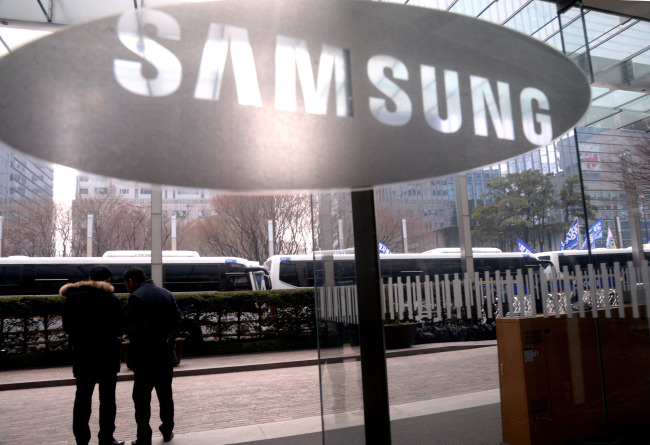Samsung Group on Tuesday announced the group will disband its controversial control tower, the Corporate Strategy Office, to take responsibility for its involvement in a corruption scandal that led to the impeachment of President Park Geun-hye and the arrest of the group’s de facto leader Lee Jae-yong.
The announcement was made after the special counsel wrapped up its 70-day investigation into the scandal on the same day as it failed to win acting President Hwang Kyo-ahn’s approval for an extension.
According to the announcement, the group will shut down the Corporate Strategy Office, better known as the Future Strategy Office, and its chief Vice Chairman Choi Gee-sung, President Chang Choong-ki and about 60 other executives will resign from their posts.
After the control tower is dissolved, around 200 rank-and-file workers and executives there are expected to return to the Samsung units to which they originally belonged.
The closure of the Corporate Strategy Office means that Samsung is ditching the top-down relationship between the group and affiliates, which has been kept for nearly 60 years since 1959. The office’s primary role has been tuning up their different tasks to unite the group’s strategies, but has been widely blamed for interrupting the operational independence of each affiliate and shareholders’ rights with no formal responsibility.
The group-led meeting of CEOs of Samsung subsidiaries will also be abolished, giving each subsidiary autonomy to operate centering on their boards of directors, the announcement said.
The group also pledged to disband Samsung’s government relations division amid its alleged role of lobbying public offices including the parliament, central government and municipalities.
Samsung would delegate such activities to local law firms, cutting its direct links to government offices, according to local reports quoting insiders. The group has been facing public criticism that it may have maintained cozy relations with politicians and officials in exchange for business favors and policy support. Samsung, however, denied the reports, calling them “groundless.”
Park Sang-jin, president of Samsung Electronics, tendered his resignation from the corporate post as well as the president of the Korea Equestrian Federation, the group also said.
Samsung executives and employees who have been dispatched to the KEF will also return soon.
Although the control tower’s closure was widely expected, rank-and-file employees across Samsung affiliates expressed mixed feelings about the announcement.

Some ordinary employees said the future strategy office deserves its dishonorable end, citing its high-handed attitude toward subsidiaries.
“We often do the same work two times at the control tower’s request, which is very inefficient,” a senior manager at an affiliate said. “Out of the blue, they order our working-level officers to report to them on a particular issue, which makes us feel they are higher up.”
Others showed concern about possible confusion in personnel reshuffle that may follow.
“Where should they go? The office’s rank-and-file employees are quite senior, and are at least in their 15th year at the company,” said an assistant manager at one of the affiliates. “Equivalent positions are already filled, and it would be awkward for them to come back.”
Market watchers raised questions about the effectiveness of the disbandment.
“What remains most questionable is how Samsung will restore transparency and public trust,” said Park Ju-gun, head of research firm CEO Score. “I don’t think shutting down the control tower would help address the transparency issue. It can’t be a complete solution.”
It was considered a natural step for Samsung to get rid of the old top-down operational management style in response to the changing global business environment to become more creative and flexible, Park explained.
“We will have to see how the affiliates can create synergy on their own in the absence of the group’s guideline,” he said.
As part of the reform plan, Samsung also pledged it would require approval from each affiliates’ boards or umbrella committees in making external donations above a certain amount.
The group, however, did not mention the abolishment of the annual recruitment system that has been led by the group. It was expected that the system would be abolished, leaving the job to individual affiliates, which range from manufacturing tech devices to biopharma products.
“The current recruitment system, including the Global Samsung Aptitude Test, is expected to be maintained for this year in order to help ease jobseekers’ concerns,” said a group official. “But each affiliate will be announcing their recruitment plans and requirements with no group involved.”
There was also speculation that the reform package would include the return of Samsung Group Chairman Lee Kun-hee’s 1 trillion won ($885 billion) fund that he had promised to give to society to appease public anger over the 2008 slush fund scandal. His son, Lee Jae-yong, said in December that he would discuss the fate of the fund with his family, as the chairman has been bedridden after suffering a heart attack in 2014.
The group is also said to be considering to offer an additional donation to placate the public over criticism that arose from allegations that a 2015 merger between Samsung C&T and Cheil Industries had inflicted financial damage to minority shareholders of the construction arm of the group and the National Pension Service.
“It is not yet confirmed, but the group will keep its promise for sure,” the official said.
By Cho Chung-un (christory@heraldcorp.com) and Song Su-hyun (song@heraldcorp.com)
-
Articles by Korea Herald










![[Hello India] Hyundai Motor vows to boost 'clean mobility' in India](http://res.heraldm.com/phpwas/restmb_idxmake.php?idx=644&simg=/content/image/2024/04/25/20240425050672_0.jpg&u=)









